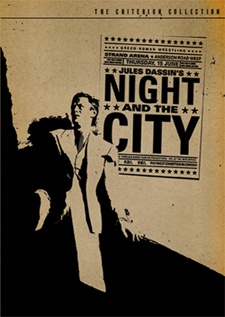|
Reviews of Recent Independent, Foreign, & Documentary Films in Theaters and DVD/Home Video
NIGHT AND THE CITY (1950)
"The night is tonight, tomorrow night or any night.” This voice over begins
Jules Dassin's 1950 film noir masterpiece Night and the City. Its connection with the
McCarthy
hearings gives it an added level of interest and depth. Filmed during the onset of the Hollywood
blacklist, its director, Jules Dassin, was a likely target.
When the smoke before the fire was obvious, 20th Century Fox production chief Daryl F.
Zanuck sent Dassin to England to make this movie,
advising him to shoot the most expensive scenes first lest his board of
directors shut the production down. Did this scheme work? For Dassin's career, no. He was
ousted from Hollywood and found it near
impossible to get work. For the movie, definitely. Night and the City
is a magnificently shot film that makes great use of the London scenery.
All Harry Fabian (played excellently by Richard Widmark)
wants is to "be somebody." He's not a good guy by any stretch
of the imagination but he's not a particularly bad one (you can't
imagine him killing or stealing on a high level, just taking a bit here
and there). Surprisingly sympathetic, he's a mostly harmless con man who is always looking
to get rich quick.
His latest scheme involves becoming a wrestling promoter, working with
the has-been Gregorius the Great. That Gregorius is
the estranged father of Kristo, the town's crime boss (played by future Inspector Clouseau
nemesis Herbert Lom) leads to further problems. Also thrown in the mix
is the Sidney Greenstreet-esque nightclub owner Phil Nosseross (Francis
L. Sullivan), who is Fabian's only backer until he betrays Fabian and sides with
Kristo. Fabian realizes he's at the end of his rope a
little too late and ends up going out in one of the least glorious ways
of any heel in cinema.
DVD Extras:
As usual, Criterion has packed the film with extras. The interview with
Dassin today is arguably its least fulfilling feature. An audio
commentary with film scholar Glenn Erickson gives a lot of insight into
the filming itself and the blacklist but not enough, however, about the film
itself. A mini-documentary exploring the two different scores
made for the film - one for the British and one for the American
release - serves mostly to show scenes cut from the American
version. (Criterion has released the American version; Dassin claims this version is closest to his
true intention.)
Without a doubt the best extra is a 1972 French interview with Dassin that gives insight into the
star and studio system as
well as his bitterness towards Elia Kazan, who cooperated with the House Un-American
Activities Committee. Brett Harrison Davinger
|
